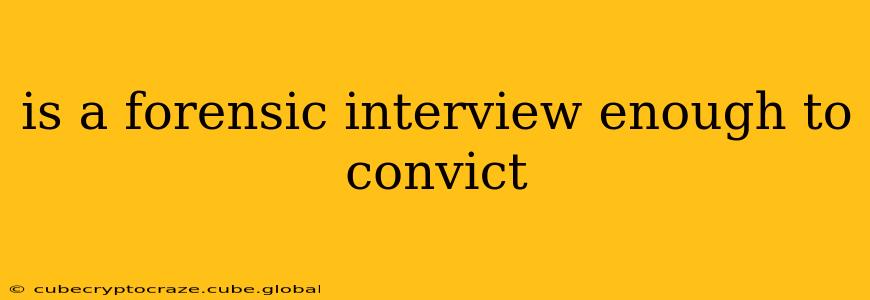Is a Forensic Interview Enough to Convict? Understanding the Role of Forensic Interviews in Legal Cases
A forensic interview, while a crucial tool in investigations, is not enough on its own to secure a conviction in a court of law. While it can provide compelling evidence, it's just one piece of a much larger puzzle. Let's delve deeper into why.
What is a Forensic Interview?
A forensic interview is a structured, investigative process designed to obtain detailed and reliable information from children or vulnerable adults who may have experienced trauma or abuse. These interviews are conducted by specially trained professionals who use techniques to minimize bias and maximize the accuracy and reliability of the information obtained. The goal is to gather factual accounts of events without leading or suggestive questioning.
Why a Forensic Interview Alone Isn't Sufficient for Conviction
Several reasons explain why a forensic interview, no matter how meticulously conducted, cannot alone lead to a conviction:
-
Lack of Corroborating Evidence: Courts require more than just a single witness account, especially in cases involving serious accusations. Corroborating evidence, such as physical evidence, witness testimonies, or documented medical findings, is vital to support the claims made during the forensic interview.
-
Potential for False Memories or Suggestibility: While forensic interviewers are trained to minimize suggestion, the possibility of false memories or suggestibility, particularly in children, remains a concern. Independent verification is essential to ensure the accuracy of the information provided.
-
Chain of Custody and Admissibility: The admissibility of evidence in court depends on the proper handling and documentation of the interview process. Maintaining a clear chain of custody for any recordings or transcripts is crucial. Failure to adhere to established legal procedures can lead to the exclusion of crucial evidence.
-
Legal Standards of Proof: The standard of proof required for a criminal conviction is "beyond a reasonable doubt." A single forensic interview, even if seemingly credible, might not meet this high standard without substantial supporting evidence.
-
Defendant's Right to Due Process: The legal system ensures that defendants have the right to a fair trial and the opportunity to challenge the evidence presented. This includes cross-examining witnesses and presenting counter-evidence. A forensic interview alone doesn't provide a complete picture or allow for adequate defense.
What Other Evidence is Typically Needed?
To build a strong case and secure a conviction, investigators usually gather a range of evidence, including:
- Physical Evidence: This could include DNA evidence, medical reports documenting injuries consistent with the allegations, or other physical traces related to the crime.
- Witness Testimonies: Statements from other individuals who may have witnessed events or have relevant information.
- Documentary Evidence: This can include photos, videos, emails, or other documents that support the allegations.
- Expert Testimony: Experts in various fields, such as psychology, medicine, or forensic science, can provide valuable insights and analysis to support the prosecution's case.
Can a Forensic Interview Lead to a Conviction?
While not sufficient on its own, a well-conducted forensic interview can be a powerful piece of evidence that, when combined with other corroborating evidence, can significantly contribute to a successful prosecution. Its value lies in providing a detailed account of events from the perspective of the victim, which can be crucial in understanding the context and severity of the alleged crime.
In summary, a forensic interview is a valuable tool in investigations, but it's a vital component of a broader evidentiary strategy, not a standalone basis for a conviction. The legal system demands a robust and comprehensive approach to ensure justice is served fairly.
